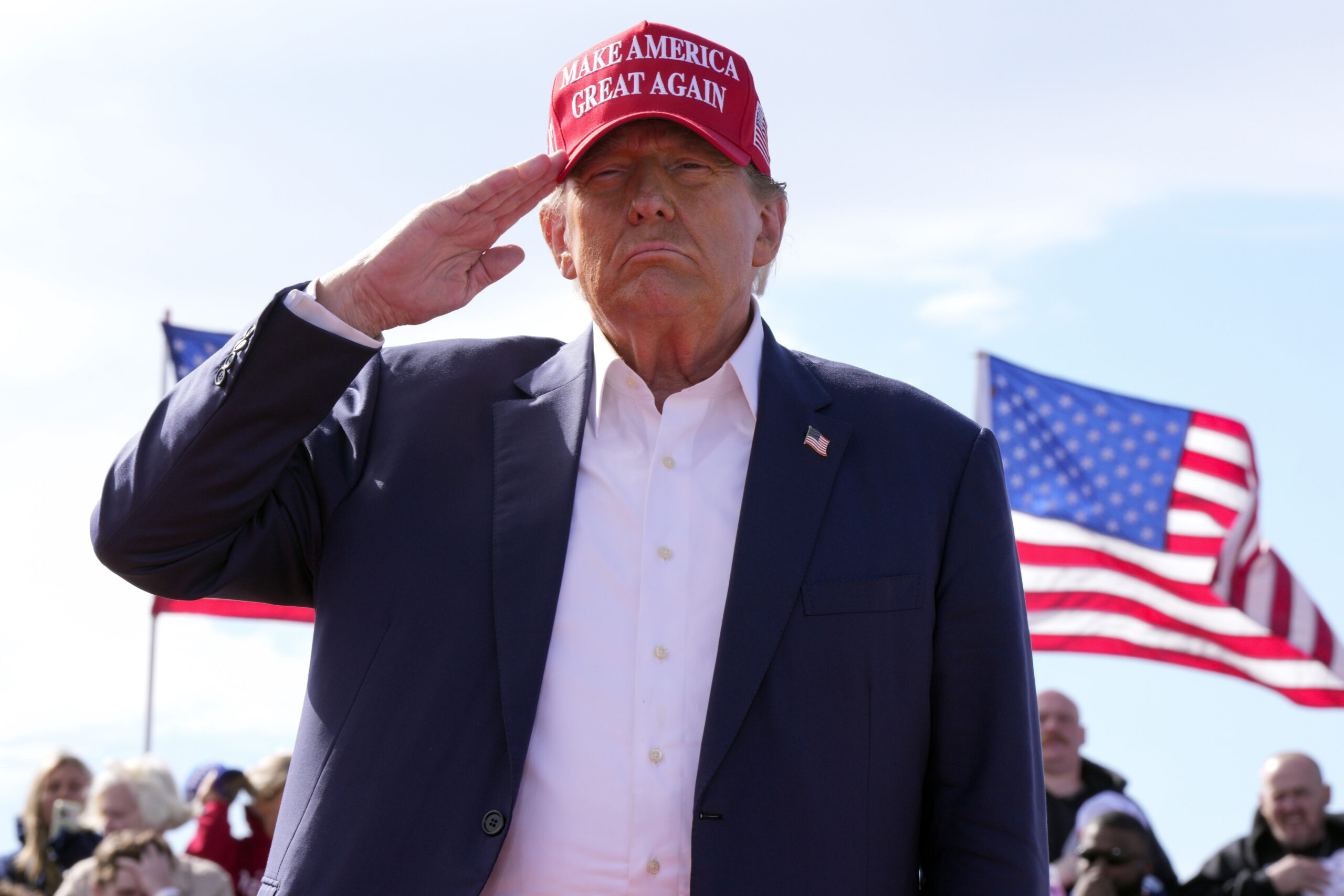

More than three years after the riot at the Capitol on Jan. 6, 2021, the Department of Justice is continuing to pursue those who participated through hundreds of aggressive prosecutions. That includes Donald Trump, whose political future and personal freedom may depend on whether a jury believes he is to blame for the violence. But the intensity of the Biden DOJ’s crackdown on Jan. 6 offenders has stirred controversy, drawn scrutiny from the Supreme Court in Fischer v. United States, and become a central focus of Trump’s third presidential campaign. In this series, Riot revisited: Jan. 6, Justice, and Capitol Consequences, the Washington Examiner will look at the legal weaknesses in the DOJ’s efforts to punish Jan. 6 rioters and the future of those cases should Trump reclaim the White House.
Former President Donald Trump has adopted as a centerpiece of his presidential campaign a promise that he will help defendants involved in the Jan. 6 Capitol riot if he is elected in November.
Trump has said he will undo the work of President Joe Biden’s Department of Justice, which has prosecuted nearly 1,500 people in connection to the riot, by vindicating those who have faced charges.
The former president’s habit of showing such sympathy and support for the defendants has drawn the gamut of reactions: praise, skepticism, fury. Some agree with Trump that the DOJ has unfairly punished the defendants, while others say Trump is disregarding evidence and that his rhetoric on the matter is insulting.
Here is a look at Trump’s promises and how he could execute them.
Trump’s remarks on Jan. 6 defendants
Trump has shown a pattern of broaching Jan. 6 on the campaign trail, and his remarks are typically met with resounding applause by crowds of supporters.
At a rally in Clinton, Iowa, he drew upon one of his preferred terms, “hostages,” as he honored the defendants on the riot’s third anniversary.
“They ought to release the J6 hostages,” Trump said. “They’ve suffered enough. They ought to release them. I call them hostages. Some people call them prisoners. I call them hostages. Release the J6 hostages, Joe.”
Trump has also said repeatedly that he will “free” them, reiterating the promise as recently as last month.
“My first acts as your next President will be to Close the Border, DRILL, BABY, DRILL, and Free the January 6 Hostages being wrongfully imprisoned!” he wrote on Truth Social on March 11.
Some, such as Tom Fitton, president of the conservative watchdog Judicial Watch, say the term hostages is a “fair analysis” and that Trump would be right to wield pardon power in their favor.
“These are folks who are the victim of government abuse,” Fitton told the Washington Examiner. “Call them what you will. They need to be pardoned. They need to have their sentences commuted.”
Trump, however, has taken criticism from others, even in his own party, for using the term “hostages.”
After Trump praised the “spirit” of participants of Jan. 6 during an Ohio rally last month, former Vice President Mike Pence indicated in a television interview that the term was not technically accurate and drew a comparison to hostages abroad being held by Hamas terrorists.
“I think it’s very unfortunate, at a time that there are American hostages being held in Gaza, that the president or any other leaders would refer to people moving through our justice system as hostages, and it’s just unacceptable,” Pence said.
Bill Shipley, an attorney who has represented dozens of Jan. 6 defendants, chalked the term “hostages” up to standard political rhetoric.
“On both sides, there’s hyperbole and narrative that is not strictly factually accurate,” Shipley told the Washington Examiner.
“I would fault the Department of Justice for some of the hyperbole, exaggeration, and inaccuracies they employ to drive the narrative,” Shipley added, observing that the DOJ had created a perception of nonstop rioting and violence on Jan. 6, when activity of that nature was, in fact, “episodic.”
Who would receive a pardon
The U.S. Attorney’s Office in Washington, D.C., keeps a meticulous record of who has been prosecuted, convicted, and sentenced.
Its most updated data shows that 859 defendants have been sentenced and 520 have received jail time.
Periods of incarceration have ranged from a few days to a few months to several years, depending on the charges involved.
Some defendants crossed into restricted areas of the Capitol grounds but left the vicinity quickly without laying a hand on anyone or any property. Other defendants were violent and destructive. Nearly 100 pleaded guilty to assaulting police officers, and dozens of others have been convicted by a jury for similarly violent offenses.
One woman, a 53-year-old hairdresser, walked into the hallway of the Capitol, stayed for 10 minutes, and then left. She later posted on social media that she was “proud” to have been “part of it,” according to prosecutors. She pleaded guilty to one of the most common misdemeanors brought against defendants: parading, demonstrating, or picketing in the Capitol. A judge sentenced her to 14 days in prison.
In a more severe case, a gym owner named Scott Fairland brandished a police baton, scaled scaffolding, urged the crowd around him to “disarm” police and “storm” the Capitol, and was captured on video shoving an officer to the ground and punching his shield. He was sentenced to 3 1/2 years in prison.
Trump has not specified exactly who he would pardon, but at a town hall last year, he said he was “inclined to pardon many of them.”
“I can’t say for every single one, because a couple of them, probably they got out of control,” Trump said, adding that he would pardon “a large portion of them” and that it would be “very early on” in his presidency.
Pardon powers
A president has unilateral clemency authority under the Constitution, and Trump could exercise that authority in office to pardon the defendants, which would erase their charges, or commute their sentences, which would reduce or end their jail time but keep their charges intact.
“A full pardon would basically — there are many people that do receive a full pardon, even though they’ve already served their sentence and they’ve been convicted — it takes away that conviction,” said Brett Tolman, a former Utah U.S. attorney who has defended a few who breached the Capitol.
Tolman said he would support Trump pardoning most of the defendants but that 200 or 300 of them “absolutely deserved to be prosecuted.”
Many legal scholars have warned that the executive authority to pardon people is uniquely broad and that it can apply to anyone who has committed an alleged crime or is anywhere in the legal process, whether they have been charged, convicted, or sentenced. However, Protect Democracy, a group founded by lawyers who worked in the Obama White House, has argued Trump’s vow to pardon Jan. 6 defendants could conflict with other parts of the Constitution and therefore be met with pushback from federal courts.
Shipley, a longtime federal prosecutor turned criminal defense lawyer, recommended that Trump set up a pardon office to review cases individually to determine whether they received appropriate treatment.
This would allow for a review of whether a given “charging decision was appropriate or not from a historical perspective,” he said, noting the office would compare the charges to those leveled during other past protest activity.
CLICK HERE TO READ MORE FROM THE WASHINGTON EXAMINER
“This town is not unfamiliar with protest activities that lead to people being arrested,” Shipley said.
He added, though, that there was “no question” that on Jan. 6, “there were people that did illegal stuff, which they should have been prosecuted for.”






